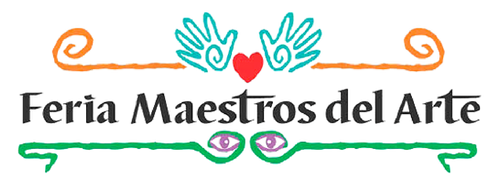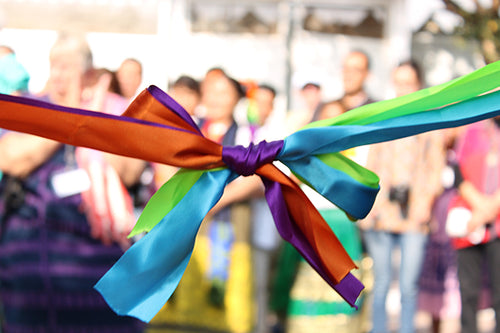
María del Rosario Jimón Barba, Tonalá, Jalisco
María del Rosario Jimón Barba pertenece a la quinta generación de alfareros dedicados a la elaboración de piezas de barro bandera y barro bruñido. Su tatarabuelo Macario fue el primero en dedicarse a esta noble tradición, seguido por su bisabuelo Anestesio, su abuelo Zacarías y su padre Agustín, quienes dejaron una profunda huella en el arte popular.
Nació el 3 de diciembre de 1960 en Tonalá, Jalisco, en el seno de una de las familias con más décadas dedicadas a la creación artesanal en el municipio. Es hija de Agustín Jimón y María Concepción Barba. Desde los 13 años, comenzó a ayudar a su madre en la elaboración de moldes, aprendiendo a desarrollar sus propias piezas bajo la guía e inspiración de su madre, quien fue su maestra y modelo a seguir.
Desde muy pequeña, comenzó a involucrarse en la artesanía ayudando a su madre a alisar las piezas de barro que elaboraba. Este primer acercamiento marcó el inicio de una vida dedicada al arte popular mexicano.
La técnica que distingue a la familia Jimón incluye el barro bandera, el barro bruñido y, actualmente, el policromado. Sin embargo, Rosario encontró su verdadera pasión y especialidad en las miniaturas, una expresión artística que le ha valido reconocimiento y premios a lo largo de su carrera. Entre sus premios más importantes, recibió un galardón en Tlaquepaque, un lugar con una gran tradición cerámica que valora profundamente.
Rosario heredó su pasión por las miniaturas de su madre, quien aprendió este arte de su abuelo Zacarías. Aunque su madre no provenía de una familia de artesanos, al casarse se integró plenamente en el oficio y le transmitió a Rosario su amor por la cerámica en miniatura.
Durante su adolescencia, Rosario aprendió a compaginar sus responsabilidades escolares y domésticas con el oficio. Ayudaba en la cocina y otras tareas antes de asistir a clases, desarrollando una ética de trabajo que ha aplicado a lo largo de su vida. Incluso cuando sus hijos eran pequeños, Rosario continuó trabajando, demostrando su dedicación y amor por la cerámica hasta el último día antes de dar a luz.
A los 23 años, María del Rosario comenzó a participar en concursos de arte popular, ganando varios premios, reconocimientos y respeto dentro del gremio artesanal. Su talento la llevó a ser invitada a participar en múltiples exposiciones y ferias, tanto nacionales como internacionales, donde ha tenido la oportunidad de llevar un pedacito de México al mundo a través de sus miniaturas de cerámica.
Es madre de cinco hijos, a quienes ha transmitido el conocimiento y el amor por la artesanía, buscando motivarlos, como lo hizo su madre con ella, para que esta tradición no se pierda.
Para la Maestra Artesana Rosario Jimón, la artesanía no es solo una fuente de sustento, sino una forma de vida que le permite expresar su identidad, preservar el legado familiar y compartir un pedacito de México con el mundo. Su trabajo es testimonio de la riqueza cultural y artesanal de Tonalá, y su compromiso garantiza que esta tradición perdure en las futuras generaciones.
El Barro Bandera y Barro Miniatura de Tonalá
El Barro Bandera y el Barro Miniatura representan una manifestación única del arte popular mexicano, cuya elaboración tiene profundas raíces culturales en Tonalá, Jalisco. Estas técnicas, heredadas y perfeccionadas a lo largo de generaciones, simbolizan la conexión intrínseca entre la identidad local, la artesanía y la transmisión del conocimiento comunitario.
Contexto cultural y significado del Barro Bandera
El Barro Bandera, o La bandera de barro se distingue por su decoración simbólica, caracterizada por franjas de colores que evocan la bandera mexicana: verde, blanca y roja. Este diseño no solo representa un acto de creatividad, sino que también resalta un profundo sentido de pertenencia e identidad nacional. Su elaboración implica una maestría técnica que abarca desde el modelado y horneado hasta la aplicación de pigmentos minerales de origen natural, reflejo del conocimiento tradicional transmitido oralmente.
La arcilla en miniatura como narrativa de lo cotidiano
La arcilla miniatura es una expresión única de la cosmovisión tonalteca. Estas piezas, de diminutas dimensiones, son representaciones detalladas de escenas cotidianas, festividades, animales y personajes populares. Más allá de su carácter decorativo, estas obras encapsulan microcosmos culturales que narran historias del entorno social, refuerzan los valores comunitarios y preservan las tradiciones en un formato accesible y coleccionable.
La Familia Jimón y la Maestra Rosario Jimón Barba
En este contexto, la familia Jimón se erige como uno de los pilares en la perpetuación de estas técnicas. Liderada por la Maestra Rosario Jimón Barba, heredera y guardiana de este legado, esta familia ha logrado preservar y difundir el arte de la arcilla para banderas y miniaturas, enfrentando desafíos como la globalización y la competencia industrial. Rosario ha combinado el aprendizaje ancestral.
con su propia creatividad para innovar dentro de los cánones tradicionales, logrando
que estas piezas adquieran reconocimiento nacional e internacional. Desde una
Desde una perspectiva sociológica, la obra de la familia Jimón no sólo refleja la
La resistencia cultural contra la homogeneización global, pero también destaca el papel del arte popular en la construcción de identidades locales. La bandera de arcilla y
Las piezas en miniatura no son sólo objetos estéticos, sino también símbolos de la
lucha por la preservación de un patrimonio que conecta el pasado con el
presente. Asimismo, estas creaciones reflejan la importancia del trabajo colaborativo.
dentro de los núcleos familiares y su impacto en la economía y el tejido social de
Tonalá.
El legado de la maestra Rosario Jimón Barba y su familia no sólo trasciende como una práctica artesanal, sino también como un acto de resistencia cultural y una reafirmación de la identidad tonalense, que perdura en el tiempo gracias a su dedicación y maestría en el arte del barro.
Texto e investigación:
Maestra Sarai Tapia
Mujer Artesana
/ Mujer artesana
INFORMACIÓN DEL ARTISTA
Martha 83, Centro,
Tonalá, Jalisco, 45400
cel 33 2563 8498
Facebook Cerámica Jimon

